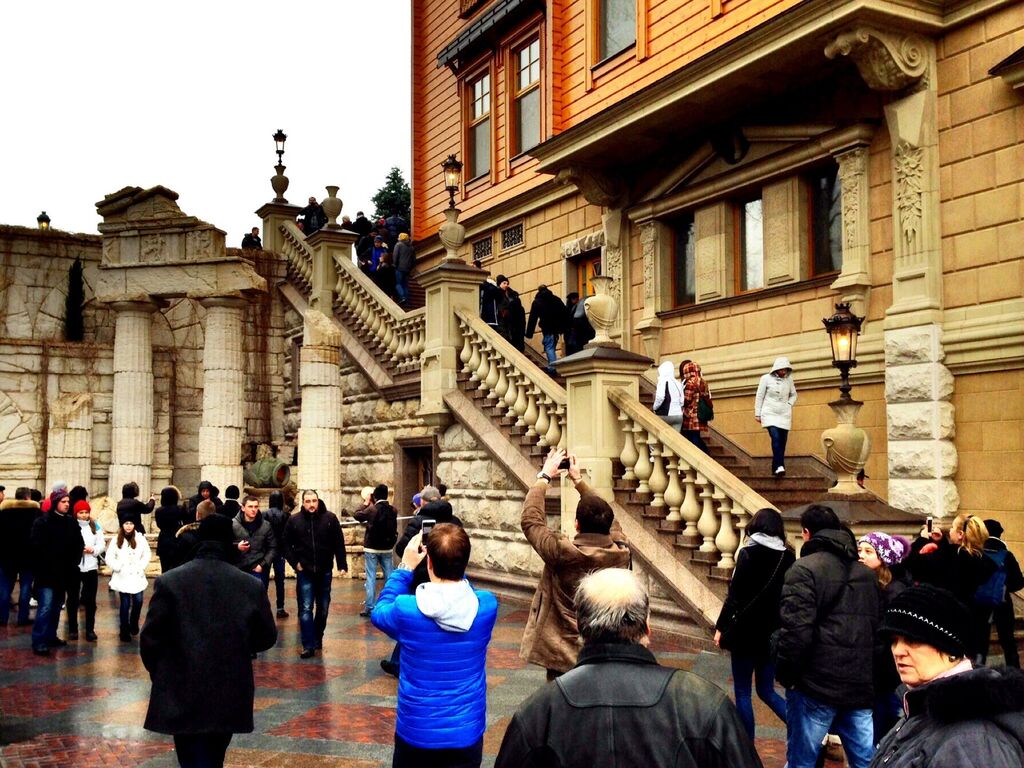Ukraine is often called corrupt in the West. And it is mostly deserved. However, Ukraine definitely should not be called a country that does nothing to overcome corruption. The anti-corruption fight is producing results, and civil society plays a huge role in this process. The EU should continue to urge Ukraine, which has become a candidate member, to strengthen its judicial and other independent bodies, argues Vadym Valko, legal expert of the Anti-Corruption Action Center and member of the NGO Automaidan.
 Ukrainians flock to the estate of Viktor Yanukovych after he fled the country during the Revolution of Dignity in February 2014. Photo Wikimedia Commons
Ukrainians flock to the estate of Viktor Yanukovych after he fled the country during the Revolution of Dignity in February 2014. Photo Wikimedia Commons
by Vadym Valko
The disease was congenital. From the Soviet Union, we inherited the absence of market relations, a distorted understanding of private property, and unjust punitive law enforcement and judicial systems. Many state-owned enterprises were taken over by their former directors for a dime. Successful businessmen also appeared. Having accumulated a lot of money (usually in a shady way), rich Ukrainians began to invest in the instruments of political influence and symbols of status – TV channels, football clubs – and in bribing government officials, judges, and law enforcement officers.
By the beginning of the 2000s, an oligarchy had formed in Ukraine — a nexus between financial and industrial groups and the government. Healthy competition became impossible, and the oligarchs monopolized entire sectors of the economy. Money was laundered from the state budget through enterprises that remained in state ownership. Private companies received government contracts for a cut that went to the official's pocket.
The society, ridden with corruption from top to bottom, was rather tolerant of multibillion-dollar scheming
People who wanted to build a political career looked for allies among the oligarchs, and the political struggle was the top of the iceberg of the struggle to control financial flows. Under such conditions, independent courts, honest prosecutor's offices, and law enforcement agencies, as well as effective public control mechanisms, were not formed in Ukraine. Any anti-corruption fight in the state was only declared but never implemented.
The growth of the corruption pyramid was facilitated by bureaucracy, overregulation, nepotism, and the meager salaries of civil servants, which incited bribery. Petty corruption—for example, obtaining driver's licenses for bribes or monetary ‘gratitude’ to doctors—has become common. The society, ridden with corruption from top to bottom, was rather tolerant of multibillion-dollar scheming.
However, an active part of society saw the threat of corruption and was ready to fight against it.
Orange Revolution and Revolution of Dignity
In 2004, Ukrainians took to the streets, protesting against the falsification of elections in favor of the candidate backed by the government — Viktor Yanukovych. Among the demands of the Maidan, or Orange Revolution, was the dismantling of the corrupt system of government. It didn't work the first time, and in the fall of 2013, protests began against Yanukovych's policies, which were first called the Euromaidan, and then the Revolution of Dignity.
The second Maidan won — Yanukovych's reign fell, and the fight against corruption gained momentum. It was driven by civil society, which was largely formed during the Revolution of Dignity — organizations such as the Anti-Corruption Action Center (AntAC), Transparency International Ukraine, Chesno, Avtomaidan, and others. They participated in the drafting of anti-corruption laws and encouraged the authorities to adopt them. The first anti-corruption body was created, the National Agency on Corruption Prevention (NACP), which coordinates anti-corruption policy and maintains an open register of electronic declarations of politicians and officials. Subsequently, independent anti-corruption institutions were created: the National Anti-Corruption Bureau (NABU), which investigates corruption and prepares cases for prosecution, and passes them to the Specialized Anti-Corruption Prosecutor's Office, and the High Anti-Corruption Court (HACC).
Corruption rating
In 2022, Ukraine scored 33 points out of a possible 100 in Transparency International's Corruption Perceptions Index, ranking 116 out of 180 countries. We are ahead of Russia, but behind Moldova and Belarus on this score. 94% of Ukrainians recognize corruption as the second most important problem in the country after the war. Even during a full-scale war, massive corruption schemes are being exposed here at various levels, including in the defense sector.
In order to reduce the dependence of the political process on business, civil society initiated the adoption of a law on state financing of parties: political forces that won a certain percentage of votes in the last elections were entitled to receive budget money.
The fight against corruption was driven by civil society
I was a participant in this process while working for Avtomaidan. It advocates for changes in the judiciary (corruption cannot be overcome without an independent court). We succeeded in reloading the most important bodies of judicial power — the High Council of Justice, which nominates judges, and the High Qualification Commission, which is responsible for the assessment and selection of judicial candidates. Our activists are members of public councils and competition commissions of anti-corruption bodies.
Moreover, civil organizations explain to people how anti-corruption bodies work and why it is important for everyone to abandon corrupt practices and join the fight against this phenomenon.
Improved rating, indictments and verdicts
Let's return to the Corruption Perceptions Index calculated by Transparency International. In 2013, Ukraine received 25 points out of 100 and scored 144th out of 177 — on par with Iran, Cameroon, and Nigeria. Since then, the indicator has been increasing – we are on a par with Bosnia and Herzegovina and Indonesia.
Prozorro's e-procurement system prevents money laundering. The introduction of the Diia portal, which gives users digital access to state services, reduces the level of bureaucracy and prevents some opportunities for bribery.
 Oligarch Kolomoisky arrested last September. Photo Telegram channel SBU
Oligarch Kolomoisky arrested last September. Photo Telegram channel SBU
Newly created anti-corruption institutions are independent of the authorities and work to expose multibillion-dollar schemes. Fifty judges, including the head of the Supreme Court, dozens of MPs and prosecutors, and deputy ministers, received indictments. Among them are several oligarchs, one of them being Ihor Kolomoisky, who was supposed to have ties to the current government. The influence of oligarchs on political processes has weakened, although this is primarily due to the Russian aggression, which dealt a severe blow to the richest Ukrainians’ fortunes.
Anti-corruption procedures, suspended since the Russian invasion, have been resumed due to public pressure
The High Anti-Corruption Court passed 140 verdicts and is considering more than 250 more cases. It is too early to say that no corrupt person will escape punishment. However, this is huge progress compared to the Yanukovych era, when only those who got in the way of the people in power were brought to justice. In addition to civil society and anti-corruption bodies, investigative journalists do a great job.
Due to martial law, the authorities have suspended a number of procedures in the anti-corruption sphere, reducing the transparency of the incomes of officials and political parties. However, after a petition signed by more than 83,000 people, the procedure of declaring the officials’ assets, suspended for ‘security reasons’, was resumed. During the large-scale war, it was possible to complete the selection of the head of the Specialized Anti-Corruption Prosecutor's Office, hold a competition for the position of the Director of the National Anti-Corruption Bureau, and approve the state anti-corruption strategy until 2025.
New areas of corruption
At the beginning of 2023, the Kyiv International Institute of Sociology (KIIS) conducted a survey on the assessment of the situation with corruption. If in 2018 only 17% of Ukrainians considered the fight against corruption to be efficient, then in 2023 this proportion increased to 50%. And the percentage of those who believe that it is ‘not efficient at all’ decreased from 51% to 22%. The most corrupt branches, according to Ukrainians, are the customs (40%), the judicial system (39%), the prosecutor's office (32%), medical services (31%), and the settlement of land issues (29%).
During a full-scale war, new areas risking corruption have appeared: bodies that make decisions about military mobilization and issue permits for crossing the border. After February 24, 2022, conscripted men cannot leave the country, so some are trying to buy this right with bribes. However, after a series of reports of corruption in military recruiting centers, the authorities began checking and dismissing the heads of these centers, as well as ordering a review of tens of thousands of decisions of medical commissions.
Scandals in the Ministry of Defense led to the dismissal of officials and a new minister
The investigation into alleged corruption in the procurement of the Ministry of Defense, which, according to journalists' investigations, procured food and goods for the army at an inflated price, gained prominence. The scandals resulted in criminal proceedings, the cancellation of procurements, the dismissal of officials, and the replacement of the Minister.
There is still no guarantee of inevitable punishment. Investigations and trials often take an unreasonably long time, and people accused of corruption can escape punishment. Sometimes legislators try to change laws, creating loopholes for corruption. Anti-corruption bodies need to be strengthened. Dismantling oligarch influence, countering monopolies and implementing judicial reforms and transparent privatization procedures, bringing the economy out of the gray zone, simplifying the tax system, and ending pressure on business are important tasks on the way to overcome corruption.
Complying with EU requirements
Although the political elites in Ukraine have been almost completely renewed in ten years, it would be naive to hope that the authorities will fight against corruption of their own free will. A powerful incentive, in addition to the pressure of civil society, are the requirements we should fulfill in order to join the European Union. After Ukraine received the status of a candidate for joining the EU in the summer of 2022, this is especially important. In order to join the EU, the state must reform the Constitutional Court, continue the judicial reform, overcome the oligarchy, fight money laundering, and effectively fight corruption. In particular, it must form a system of independent anti-corruption bodies.
Ukraine has already fulfilled most of its commitments. In the latest report, the European Commission positively assessed the fulfillment of all requirements even in the conditions of war and urged Ukraine not to stop improving the effectiveness of anti-corruption institutions.
It is no secret that the image of Ukraine as a ‘corrupt, insolvent state’ has been promoted by Russian propaganda in the last ten years. The West should reject this stereotype, which definitely has nothing to do with the actual situation now, because every day of its struggle against Russian aggression, Ukraine proves both its capability as a state and its devotion to European values.
Daria Kaleniuk, co-founder and executive director of the Ukrainian Anti-Corruption Action Centrer (AntAC), will be our keynote speaker for the October Lecture on Monday 30 October. The title of her lecture is: 'The future of Ukraine starts now: How civil society is reforming Ukraine and what the west can do'. Tickets can be bought here.
